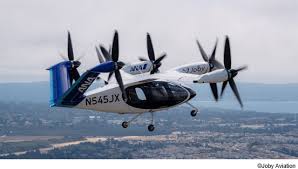Revolutionizing Urban Air Mobility: eVTOL Demonstrations Scheduled for Expo 2025 Osaka
During Expo 2025 in Osaka, Kansai, Japan, ANA Holdings and Joby Aviation will unveil a captivating public showcase of the Joby S4, a cutting-edge electric vertical takeoff and landing (eVTOL) aircraft. From October 1 to 13, 2025, visitors will witness the future of sustainable aerial transport marked by vertical departures and landings combined with efficient wing-borne flight.
Flight Schedule and Demonstration Details
The demonstration flights are designed to display piloted operations, including full transitions between vertical and horizontal flight modes. Daily flights will take off from the EXPO Vertiport in the Mobility Experience zone on the west side of the Expo site, with two scheduled departures at 11 a.m. and 2 p.m. There is also a possibility of an additional flight around 4 p.m. on Saturdays.
Each flight will last approximately 10 to 15 minutes, offering a close-up experience of electric air taxi capabilities. On days when no flights are scheduled, namely October 3 and 8, the public can view the Joby S4 aircraft up close at the EXPO Vertiport hangar.
Overview of Demonstration Flight Dates and Timings
| Date Range | Flight Times |
|---|---|
| Oct 1 – Oct 2, 2025 | 11 a.m., 2 p.m. |
| Oct 4 – Oct 7, 2025 | 11 a.m., 2 p.m., possible 4 p.m. Saturday flight |
| Oct 9 – Oct 13, 2025 | 11 a.m., 2 p.m. |
Electric Vertical Takeoff and Landing: A Glimpse Into Future Aviation
The Joby S4 eVTOL represents a transformative leap in aviation technology, using electric propulsion for both vertical takeoff and landing. This approach offers quiet, emissions-free flights suitable for urban and regional environments increasingly focused on sustainability.
The significance of this showcase lies in the demonstration of not just flight capability but also the seamless shift between vertical and winged flight — a critical feature for efficient longer-distance air travel beyond typical drone-like hovering.
What Is eVTOL and Why Does It Matter?
- Electric propulsion: Reduces carbon footprint and noise pollution compared to traditional aircraft.
- Vertical takeoff and landing: Eliminates need for long runways, allowing operations in urban centers or near waterfront marinas.
- Wing-borne flight capability: Enables efficient cruising speeds, extending range and versatility.
A Brief Historical Perspective on Aviation Evolution
The journey from the early days of aviation to today’s advent of eVTOL technology has been remarkable. Since the Wright brothers’ pivotal powered flight in 1903, air transport has evolved into one of the globe’s main drivers of connectivity, tourism, and commerce.
Scheduled airlines expanded rapidly in the 20th century, opening aerial pathways across continents and oceans. Regions like Japan have developed impressive infrastructure with international airports like Kansai International serving as hubs for both domestic and global travel.
The integration of new technologies such as electric planes reflects aviation’s constant thrust toward innovation, blending speed, safety, and environmental consciousness.
Milestones in Aviation History Impacting Travel and Tourism
| Era | Key Development | Impact on Travel |
|---|---|---|
| 1903 | First powered flight by the Wright brothers | Laid foundation for modern aviation |
| 1920s-30s | Establishment of the first commercial airlines and transcontinental flights | Expanded travel options; boosted international tourism |
| Late 20th century | Jet engine and wide-body aircraft | Enabled mass air travel and globalization |
| 21st century | Emergence of electric aviation and eVTOL | Promises sustainable, urban mobility solutions |
Looking Ahead: eVTOL Technology’s Role in Tourism and Urban Mobility
The demonstration flights at Expo 2025 symbolize more than a technological marvel; they hint at profound shifts in the way people may travel in coming years. These electric air taxis could serve busy urban regions, linking airports, coastal marinas, and city centers effortlessly, reducing travel times and environmental impact.
Within Japan’s vibrant travel market—boasting destinations from the beaches of the Inland Sea to scenic lakes and bustling urban areas—innovations like eVTOL could open new access to coastal and island resorts for yachting and boating enthusiasts. This would enrich the marine tourism experience by integrating seamless air and sea connections.
Potential Benefits of eVTOL Integration in Tourism
- Improved accessibility: Quick transfers from airports to marina hubs and beach resorts.
- Eco-friendly options: Lower emissions support preservation of pristine coastal waters and natural areas.
- Reduced congestion: Alleviates pressure on roads and supports sustainable tourism growth.
결론
The upcoming showcase by ANA Holdings and Joby Aviation during Expo 2025 Osaka spotlights eVTOL’s promising future in revolutionizing air travel with electric vertical flight technology. This innovation fits into Japan’s broader evolution as a dynamic touristic hub with advanced infrastructure, connecting cultural cities and stunning maritime landscapes.
For those passionate about sailing, boating, or marine adventures, such technological strides promise enhanced travel experiences by linking air mobility with the allure of ocean and lake destinations.
GetBoat (GetBoat.com) is an international marketplace for renting sailing boats and yachts, offering options to suit every taste and budget—ready to serve as the ideal companion to these developing marine and air travel trends.

 ANA Holdings and Joby Aviation to Present eVTOL Demonstrations at Expo 2025 Osaka">
ANA Holdings and Joby Aviation to Present eVTOL Demonstrations at Expo 2025 Osaka">
